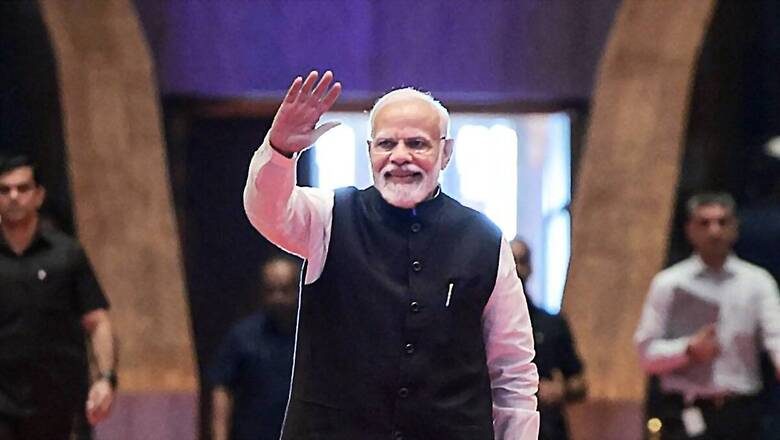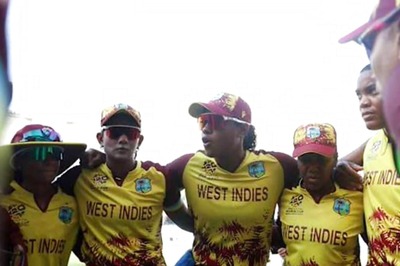
views
As the deadly conflict between Israel and Hamas crosses the one-month mark, India’s diplomatic outreach on the issue has maintained its historical stance of neutrality while confronting the contemporary spectre of terrorism, a scourge it has battled within its own borders for decades.
India has sustained a strategic balance, unequivocally condemning terrorism while also sending humanitarian aid to the battered Gaza Strip. The country’s position reflects its historic stance of non-alignment and an emphasis on peaceful resolution, steering clear of overt partisanship in a region where it has significant strategic interests.
A SERIES OF CALCULATED DIPLOMATIC MOVES
Prime Minister Narendra Modi’s intensive diplomatic engagement with leaders from Iran, Egypt, the UAE, Palestine, Israel, and Jordan reflects India’s aim to promote de-escalation and dialogue. The discussions with Iran’s President Raisi and Egypt’s President El-Sisi focused on shared concerns over terrorism and the deteriorating security situation. Meanwhile, dialogues with UAE President Sheikh Mohamed bin Zayed and Jordan’s King Abdullah II have underscored the need for stability in a region where India has significant energy and security interests.
The conversation with Palestinian President Mahmoud Abbas highlighted India’s traditional support for the Palestinian cause. PM Modi reaffirmed India’s long-standing and principled position on the Israel-Palestine and conveyed concern over the violence and security deterioration.
In stark contrast, his talk with Israeli Prime Minister Netanyahu saw PM Modi standing in solidarity with Israel against terrorism. This dual approach typifies India’s attempt to be a friend to all in the region, a policy that has its roots in the nation’s founding philosophy.
INDIA AT THE UNITED NATIONS: A PRINCIPLED STAND
At the UN General Assembly, India’s abstention from a resolution on the conflict was a statement in itself, shaped by the resolution’s omission of an explicit condemnation of the October 7 terrorist attacks in Israel. India’s affirmative vote on an amendment to include such condemnation, though unsuccessful, signaled its consistent stand against terrorism.
Former diplomat Anil Trigunayat characterized India’s stance as principled, noting the nation’s balanced approach to denouncing Hamas’s terror attacks and providing humanitarian support to Palestinian civilians India’s Role in Regional Stability.
Dr Bharti Chhibber, who teaches International relations at Delhi University, says India’s firm stand on terrorism has also to do with its decades of suffering from the menace. “India herself suffered cross-border terrorism and would always take a strong stand against the menace of terrorism,” says Chibber.
The ongoing conflict has the potential to reshape the dynamics of West Asia, and India’s role could be pivotal. With its historical ties to both Arab nations and Israel, India’s voice is influential. Trigunayat suggests that post-conflict, India could play a constructive role in the peace process, given its credibility and the importance of West Asian stability to India’s interests. “India is looking for a peaceful resolution of the Palestinian issue once this conflict is over and there she can play a credible and constructive role as the security and stability of West Asia is of utmost importance to India’s own,” said Trigunayat.
THE HUMANITARIAN COST
The war has inflicted a heavy civilian toll, with over 10,000 casualties reported in Gaza, since the Israeli forces launched their counter offensive against the Hamas. While Israel has lost 31 of its soldiers, Hamas has taken about 240 hostages in Gaza, many of them foreign nationals. Missile strikes continue across the Gaza Strip as the conflict between Israel and Hamas shows no signs of abating. The United Nations has also lost about 90 of its work force in Gaza in the ongoing war. Most of the civilian structures in Gaza, including hospitals, schools and colleges, have come under attack of Israeli forces, in an attempt to flush out Hamas terrorist.
The Rafah crossing from Egypt into Gaza has become the focus of the international effort to provide humanitarian aid to desperate people who have been bombarded and displaced in the besieged enclave. While the relief from world over has reached Egypt for the Gazans, the heavy security and multiple scrutiny of these materials at Egyptian border point Al Rafah has frustratingly slowed down the distribution process.
LOOKING AHEAD
In the complex geopolitical landscape of West Asia, India’s nuanced diplomacy is being tested as never before. The country’s stance in the UN and bilateral discussions with regional powers underscore its dedication to a foreign policy that does not shy away
from condemning terrorism while promoting dialogue and humanitarian values. India’s intricate balancing act is not without risks, but it is a testament to India’s evolving role on the world stage as a proponent of peace and stability.
As the world watches the ongoing strife in West Asia, India’s diplomatic tightrope walk offers a glimpse into the possible emergence of a new paradigm in international relations—one where strategic partnerships and principled stands are not mutually exclusive, but are woven together in pursuit of long-lasting peace.















Comments
0 comment